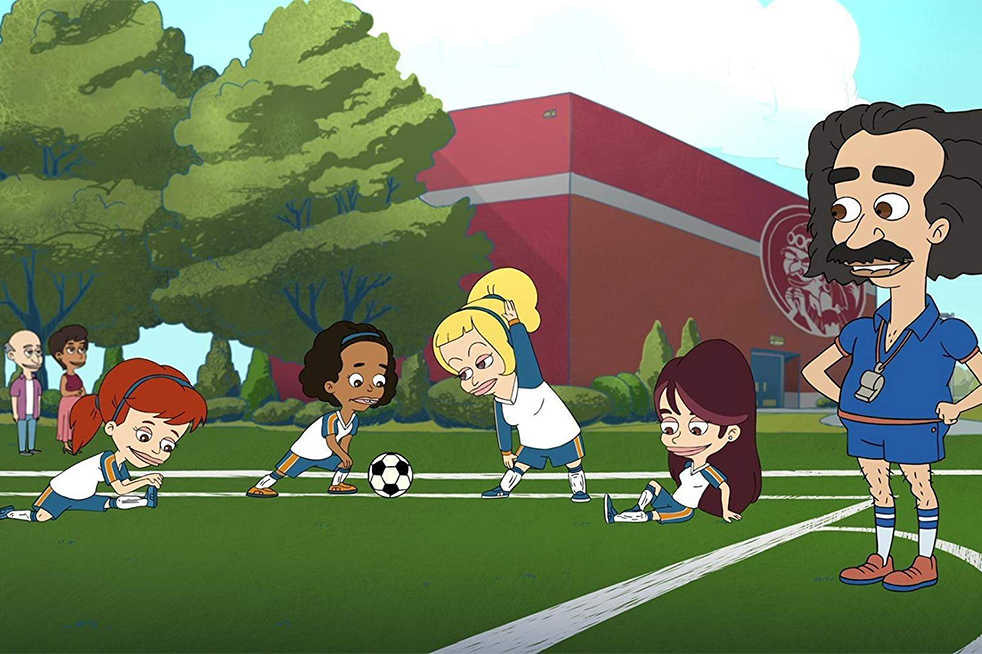Conventional television wisdom would have never allowed a series like Netflix’s “Big Mouth” out of the writer’s room. Although adult animation has become a staple of America’s television diet — see the 22 seasons of “South Park”, the rabid fanbase of “Rick and Morty” or Seth MacFarlane’s entire career — few shows in the genre dare broach the topics that make up the foundation of the comedy in “Big Mouth”.
The show centers around a group of seventh graders that, due to their raging hormones, find themselves both tremendously confused and perpetually aroused. Nick (Nick Kroll), Andrew (John Mulaney) and Jessi (Jessi Klein) make up the show’s core cast.
Each character brings various facets of the pubescent experience to the show: Nick is a late bloomer who deals with the crushing pressure of fitting in with peers fraught with growth spurts and unfamiliar urges; Andrew is a newly-minted teen — cracking voice, moustache and all — navigating the labyrinth of puberty with the help of his hormone monster Maurice; Jessi, the show’s female lead, struggles to find her identity while dealing with the pettiness of her peers and the myriad effects of her parents’ divorce.
The first season tackled the controversial topic of budding sexuality with an astounding level of tactful candor. Artists in the position of Kroll and Andrew Goldberg — the show’s creators — find themselves toeing a line between crude sexualization of teenagers and a frank expression of the human experience, and “Big Mouth” ultimately leverages that to create what could be the most refreshing portrayal of puberty to ever find its way to the small screen.
The prospect of a second season, however, predictably elicited questions from viewers. Could Kroll and Goldberg possibly hit the nail on the head once again? Would they unnecessarily attempt to push boundaries further and ruin the legacy of the first season? Was there even a worthy story left to be told?
The creators did not just navigate this minefield successfully; Kroll, Goldberg and the rest of the writing room tap danced their way to safety. Their follow-up perfectly captured the charm of the original season while expanding both the plot and the scope to encompass such topics as divorce, drug use, depression and the rampant slut-shaming which is ubiquitous in grade-school hallways.
The lucidity present in the show’s representation of the complex issues of adolescence creates a universally relatable narrative in the most unlikely of genres, but it is Kroll and Goldberg’s mastery of the medium that manages to make its topics more real than anything else on TV.
Complex aspects of puberty are boiled down into physical representations; hormone monsters follow the children around, serving as a sort of ‘devil on the shoulder’ by guiding them through their everyday lives. A new addition this season, the Shame Wizard — voiced by David Thewlis of “Harry Potter” fame — personifies the guilt that often stems from pubescent feelings. This unique cast of characters allows “Big Mouth” to tackle subjects that would otherwise weigh a show down and cause it to completely miss the mark.
While several other aspects of the season deserve attention, few of the topics the show tackles are presented as masterfully as the idea of homosexuality. Season one introduced the character of Matthew, a seemingly one-dimensional gay teen. Catty, flamboyant and drama-obsessed, Matthew anchored the show’s representation of homosexuality in a static and uninteresting location far from the forefront.
Season two, however, delves deeper into the mindset of the gay teen and lays his fears and insecurities bare for the audience to see. His anxiety about his position in ‘limbo’ between his male and female peers becomes a major plot point and ultimately subverts the gay archetype established in season one. More than anything else, this plotline demonstrates the maturity of the writers in tackling controversial and often-overlooked issues.
But behind all of this, “Big Mouth” ultimately succeeds due to its humor. This is one of the funniest shows on TV, due in no small part to the voice acting of big-name comedians like John Mulaney (“Saturday Night Live”), Jason Mantzoukas (“The Dictator”), Jessi Klein (“Inside Amy Schumer”) and Maya Rudolph (“Bridesmaids”). The potentially-awkward subject matter is made palatable by an irreverent, cerebral and ultimately hilarious sense of humor that permeates every aspect of the show.
Season two of “Big Mouth” was tasked with expanding on the show’s critically-acclaimed pastiche of teen life, and through clever writing, bold direction and top-shelf humor the show has managed to deliver in a big way. The season finale makes it clear that “Big Mouth” plans to return with yet another slew of episodes, but, unlike last year, viewers can now weather the period between seasons with confidence that the show’s creators will know how to follow up.
